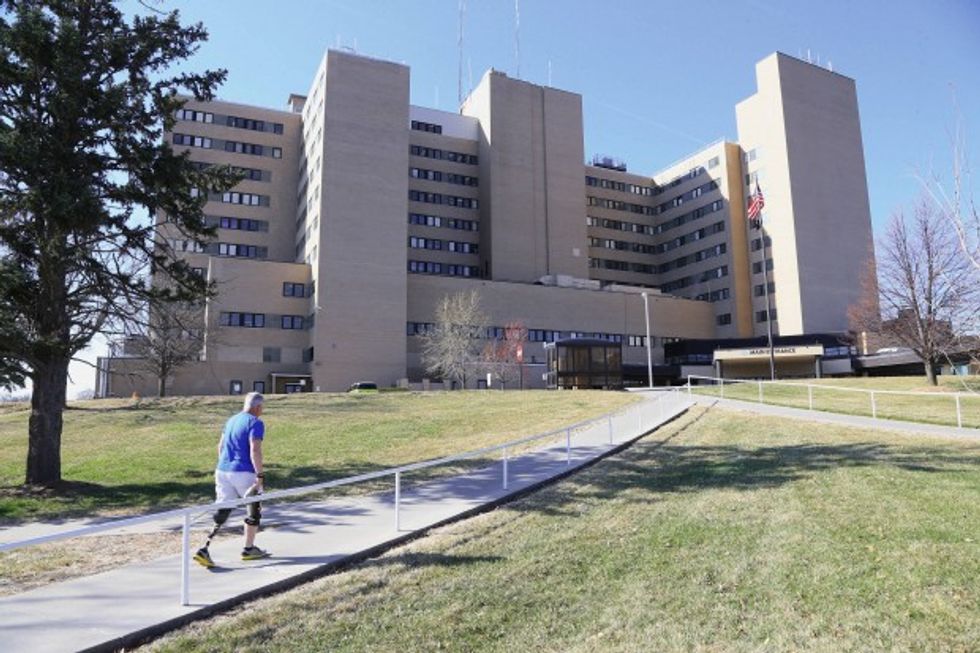The Department of Veterans Affairs has 41,500 job openings, according to a recent report from USA Today.
While the figure is shocking, the concept is not. Sadly this is just one in a series of stories of dysfunction within the VA, and yet another indictment against government-run health care in general.
Instead of remaining trapped in a broken system, veterans – and all Americans – should be free to access quality, affordable healthcare of their own choosing.
The problems at the VA are a mismatch of supply and demand: There's a shortage. But this problem isn’t unique to the VA. In fact, a shortage of medical professionals plagues our entire health system, largely because of government meddling in the market.
 In this April 1, 2015 photo, an unidentified person with a prosthetic leg walks to the VA hospital building in Omaha, Neb. (AP/Nati Harnik)
In this April 1, 2015 photo, an unidentified person with a prosthetic leg walks to the VA hospital building in Omaha, Neb. (AP/Nati Harnik)
On the supply side, government controls how many medical residency positions are funded. On the demand side, the government infuses money into programs (the VA, Medicare, Medicaid, Obamacare) that increase demand for healthcare services.
Policymakers who favored Obamacare’s coverage expansion seemingly ignored this mismatch in slow-growing supply and exploding demand, making a shortage all but inevitable.
The same market realities are behind the VA’s constant inability to serve veterans well. The VA can say all veterans are covered; but actually providing veterans with care is a different matter altogether.
Part of the problem is that the VA pays medical professionals less than other hospital systems do, and it takes longer to approve and start staff in new positions.
Veterans deserve the very best healthcare services our country has to offer, but instead they are getting second-class care.
Last summer, whistleblowers at the VA came forward with information about “secret waiting lists” that had been manipulated to hide deaths of veterans who were unable to access timely care. Of course, Americans were appalled to learn that such a cover-up took place. Waiting lists are one way that shortages manifest; they are common in countries with “universal health care.”
Similar to the VA, other public plans, like Medicare and Medicaid, reimburse providers at below-market rates, and these programs take more time to process claims than private insurance companies do. Obamacare plans are also mimicking these trends.
 . (Photo credit: Shutterstock)
. (Photo credit: Shutterstock)
This discourages providers from seeing these patients, making it harder for them to get timely care. It also limits their choice in doctors and hospitals (again, similar to the VA).
Veterans, along with those enrolled in Medicare, Medicaid, and Obamacare, should be allowed to take their healthcare dollars into the better, freer, private market.
Americans – particularly veterans – know how giving individuals power over the resources that will be spent on them can create better options. For two long, our education system (similar to health care) has been bifurcated into public and private options.
But we’ve seen how when education consumers are allowed to make choices for themselves and their families, such as through the GI Bill for military personnel or voucher programs for lower-income families, schools respond by offering better services that make sense for those individual students.
Just as this “school choice” movement has improved education opportunities for millions, a “healthcare choice” policy could allow vets, seniors, and low-income people to choose a private insurance plan and let the dollars follow the patient.
No one, especially not veterans, should be trapped inside an inefficient, government-run system with thousands of unfilled jobs, long waiting times, and cover-ups to hide death and dysfunction.
Our broader healthcare policy should be a 180-degree pivot from this bureaucratic single-payer approach. Policymakers would be wise to stop ignoring the realities of the market in health care, and start allowing it to work.
–
TheBlaze contributor channel supports an open discourse on a range of views. The opinions expressed in this channel are solely those of each individual author.


 In this April 1, 2015 photo, an unidentified person with a prosthetic leg walks to the VA hospital building in Omaha, Neb. (AP/Nati Harnik)
In this April 1, 2015 photo, an unidentified person with a prosthetic leg walks to the VA hospital building in Omaha, Neb. (AP/Nati Harnik)
 . (Photo credit: Shutterstock)
. (Photo credit: Shutterstock)






